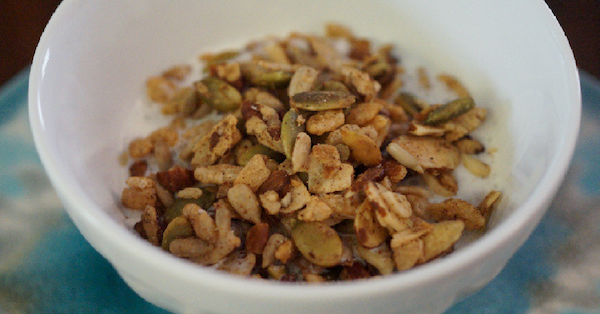You’ve heard it before, “Breakfast is the most important meal of the day!” While this statement is indeed true, it is far more so for those with high blood sugar.
A recent study of type II diabetics demonstrated that consuming a high-energy breakfast every day improves blood sugar levels and promotes weight loss.
The study consisted of 18 men and 11 women averaging 69 years in age who had type II diabetes. Participants were randomly assigned one of two different weight-loss diets (containing an equal number of calories) over a three-month time period.
One group ate three meals a day consisting of a large breakfast, a medium-sized lunch and a small dinner. The second group ate six small meals (including three snacks) that were spaced evenly apart throughout the day.
In the three-meal per day group, fasting blood sugar levels decreased from 161 to 107, while the six-meal per day group fasting levels decreased from 161 to 141. While both groups experienced a decrease in fasting blood sugar, the three-meal per day group enjoyed more than double the drop!
It’s important to note that these decreases in blood sugar levels began after as few as 14 days on the diet, while participants still weighed the same as that did at baseline. This suggests that decreases in blood sugar based on diet changes can happen even before the individual experiences weight loss. Is that encouraging or what?
We live in a very weight-conscious society, and tend to equate weight with health. For type II diabetics, it is often heard from physicians that maintaining a healthy weight helps manage blood sugar; and it’s true. If you are on a journey to lose weight and lower your blood sugar through diet, take heart. Positive changes in blood sugar could be happening far before the scale shows you the number you want to see – just keep working!
Research has found time and again that those who do not eat breakfast weigh more than those who do eat breakfast. Those who skip breakfast are also more likely to experience blood sugar spikes throughout the remainder of their day. Those who eat breakfast enjoy more stable blood sugar all day long.
So what does a healthy, high-energy breakfast look like? While it is true that carbohydrates are used by the body for energy, diabetics must get their fuel from other sources in order to keep blood sugar under control. The key to a blood sugar stabilizing, high-energy breakfast is the balance of protein, healthy fats, and fiber.
The most classic breakfast food is an “eggs-ellent” addition… eggs! Eggs are a great source of morning protein, and are a great base for our high-energy breakfast. Add half an avocado and a side of sliced apple sprinkled with cinnamon and you’re good to go! The next question is – how do you like your eggs?
If you love a perfectly scrambled egg, the keys are heat and a little patience. Keep the stovetop on medium heat. With one hand, gently move the pan in a circular motion over the heat.
With your other hand, stir the eggs in the opposite direction until they are set. (Keep in mind, they will continue to cook in the hot pan even after you turn off the stovetop, so you may want to pull them off the heat just before they are set to your preference.)
In a hurry? Make a 60-second omelet instead! In the bottom of a large coffee mug, microwave one tablespoon of butter for 15 seconds. Crack two eggs into the mug, along with a splash of whole milk, salt and pepper. Add any additional fillings (cheese, ham, bell peppers, mushrooms, tomatoes, etc. and whisk with a fork. Microwave for one minute and its omelet time.
Egg muffins are a great grab-and-go breakfast for busy mornings. Crack eggs into a bowl and scramble with a fork. Brush your muffin tin cups with a little bit of melted butter. Add your fillings of choice – crumbled bacon, cheese, spinach, tomatoes, etc. to the bottom of each tin. Crack eggs into a large bowl, add a splash of whole milk, salt and pepper, and whisk.
Pour the egg mixture into each muffin tin cup. Don’t fill the cups all the way to the top; only fill them about ¾ full as the eggs will rise a bit. Bake at 350 degrees for 20-25 minutes. If there are any leftovers, they will last in the fridge for up to a week, or in the freezer for up to a month!
Not an egg lover? Try a bowl of this low carb Diabetic Kitchen Cinnamon Pecan Granola Cereal.
Breakfast really is the most important meal of the day, especially for diabetics. Whether it’s eggs or low carb cereal, breakfast is absolutely crucial to managing weight, blood sugar, and overall health!
Source:
https://www.sciencedaily.com/releases/2018/03/180318144831.htm


Leave a Reply